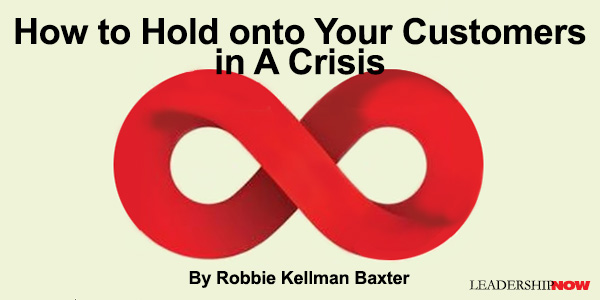 |
 |
04.08.20

How to Hold onto Your Customers in a Crisis
SUBSCRIPTION-BASED businesses seem to be the most resilient during this time of crisis. With predictable recurring revenue, they have greater flexibility to withstand the storm. But there’s more to it than just revenue. To hang onto customers during a crisis, you need to build a forever transaction with the people you serve. Your team has to know what your “forever promise” is—the organization’s commit-ment to customers that justifies customer loyalty. If you don’t have a forever promise, you’re sunk. I’ve observed companies panicking and doing anything they can to manage short-term cash—and destroying hard-earned relationships at lightning speed. Companies are making bad decisions for good reason. They are letting short-term financial objectives become the North Star in an effort to keep the lights on. But when the dust settles, they will have lost the trust that makes customer loyalty possible. And, they will have lost the trust of the employees they’ve counted on for years to serve those customers with grace, passion, and perseverance. Customers will remember which hotels and theaters offered a refund on unusable reservations, which newspapers dropped their paywall and provided free content, and which gyms quickly mobilized to send out daily video fitness classes. They will also remember the companies that took advantage of the crisis by gouging on price. Or those that laid-off employees with little to no notice, leaving these formerly loyal workers to fend for themselves when their rents and mortgage payments came due. In times of crisis, relationships become much more volatile—people can quickly move from love to hate with a company that lets them down. In these times, customers are quicker to connect, let their guards down, and trust. But these same customers are also quicker to end their relationship forever with a company that violates their trust. Reputations that took years to build can be destroyed in two weeks. Relationships that used to take years to unravel can unravel in days. On the other hand, companies that have a long-term focus and take good care of their customers and employees during a crisis win lasting loyalty. This phenomenon is especially powerful for subscription businesses and any business—subscription or not—that has a true “membership mindset.” Companies with a membership mindset do everything they do with the objective of creating long-term value for each and every customer. Their businesses are not comprised of anonymous transactions, and their customers are not just an account number or the next person in line. Every customer is a special person with special needs, who is a pleasure to serve. Those that have predictable recurring revenue streams are better positioned to survive the crisis. Products and services people subscribe to are used by customers on an ongoing basis, which means that they’re habits—so customers are less likely to stop. Also, it takes more energy to proactively make a decision to buy than to make a decision to stop paying for something that has already been decided. In this crazy time, some businesses have seen a massive spike in demand. Video communications, headset manufacturers, content creators, delivery services, and manufacturers of cleaning supplies, face masks, and toilet paper are inundated with new demand. For these organizations, the question is how to turn this spike into an ongoing relationship. Hint: It’s not by price-gouging…it’s by onboarding these new members to stay for the long-term. Here are six things you can do right now to build and maintain strong customer relationships during this crisis.
 
Posted by Michael McKinney at 07:57 AM
|
BUILD YOUR KNOWLEDGE
 

How to Do Your Start-Up Right STRAIGHT TALK FOR START-UPS 
Grow Your Leadership Skills NEW AND UPCOMING LEADERSHIP BOOKS 
Leadership Minute BITE-SIZE CONCEPTS YOU CAN CHEW ON 
Classic Leadership Books BOOKS TO READ BEFORE YOU LEAD |